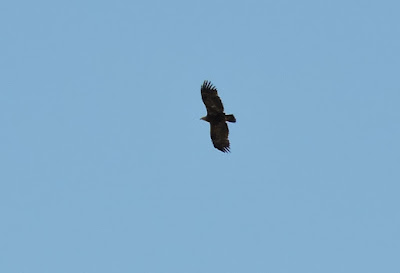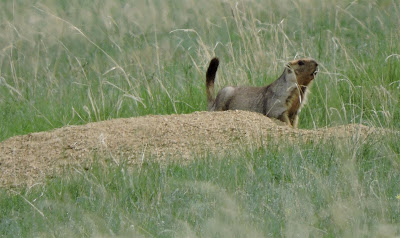It is famous as the home for the largest population of Przewalski's horses in the world. However I was there for the birds.
The area is predominantly steppe and some wetter grassland with a few narrow more wooded valleys.
It was certainly a good place to see birds of prey. We found that investigating the wooded valleys bought the best reward for these.
In one of them, two cinereous vulture shot out right in front of us.
cinereous vulture
Near another three upland buzzard circled over head.
upland buzzard
This was a lifer for me but I very quickly became educated about how variable they can be. Their colour spectrum is as varied as with steppe buzzard.
another upland buzzard
High above two steppe eagle were observed.
steppe eagle
This was not the end of the birds of prey. On a wire near the park entrance/exit was a female Amur falcon.
Amur falcon
A little earlier three common kestrel were sighted over a side valley.
common kestrel
Probably only the steppe eagle would eat the marmot which are common and readily seen. The same probably goes for ground squirrel.
marmot
However some of the others especially the buzzards might take pika which are smaller mammals which can be found in the national park.
There also must be plenty of small birds and insects to sustain so many birds of prey.
Hustai National Park
It was in the park that I came across my first Mongolian lark.
Mongolian lark 1
This bird likes long grass but often gives its presence away by stretching up to view its surroundings. I found it quite flighty.
Mongolian lark 2
skylark
Pere David's snowfinch
Two wheatears also appeared regularly as we toured round the park.
Isabelline wheatear
Isabelline wheatear was encountered on the plains.
Pied wheatear 1
On the rocky slopes the prelevant wheatear was pied wheatear.
Pied wheatear 2
My house in Bulgaria is within a few kilometres of one of the most westernly population of pied wheatear in the world. Hustai National Park is one of the most easterly. Until I reached there, I hadn't fully comprehended how large its range is. Furthermore most of the birds migrate through the Middle East to Afirca and the Middle East is my main birding haunt. So it felt like seeing a friend a long way from home.
Daurian shrike
Another bird which migrates to the Middle east and indeed many of which stay the winter is Daurian shrike. One was seen in the park.
I was interested to know how to pronounce Daurian. Apparently according to my hosts Dauria is the region of Mongolia and north east China (sometimes called Manchuria). The place is pronounced dour- ria where dour rhymes with hour and is not pronounced like door.
Pine bunting 1
In the same valley, we came across a pine bunting.
Pine bunting 2
On the last part of the route we started to see more large mammals. Three quarters of the way round, we observed a large herd of reed deer.
Red deer
Five kilometres further on, we meet up with a herd of Prewalski horse. Indeed this was almost the only place we encountered other people who were in 4x4s and buses. I suppose the horses are used to the attention.
Przewalski's horse
In 1945 there were only 13 Prewalski horse left on the planet. Now there are 1500 of which 300 are in Hustai national Park. They are the only sub species of horse other than domestic horse which is not extinct. All other horses are breeds not sub species.
The area was also the best place to see northern raven in the park though probably only Gansukh and I were interested.
northern raven
I am indebted to Gansukh for his guidance which was under the birdingpal scheme. He was a truly attentive and committed guide.
Species seen at Hustai National Park
Cinereous Vulture
Steppe Eagle
Black Kite (Black-eared)
Upland Buzzard
Feral Pigeon
Eurasian Hoopoe
Amur Falcon
Daurian Shrike
Common Magpie
Red-billed Chough
Common Raven
Mongolian Lark
Skylark
Barn Swallow
Pied Wheatear
Isabelline Wheatear
Pine Bunting
House Sparrow
Tree Sparrow
Pere David's Snowfinch






















No comments:
Post a Comment